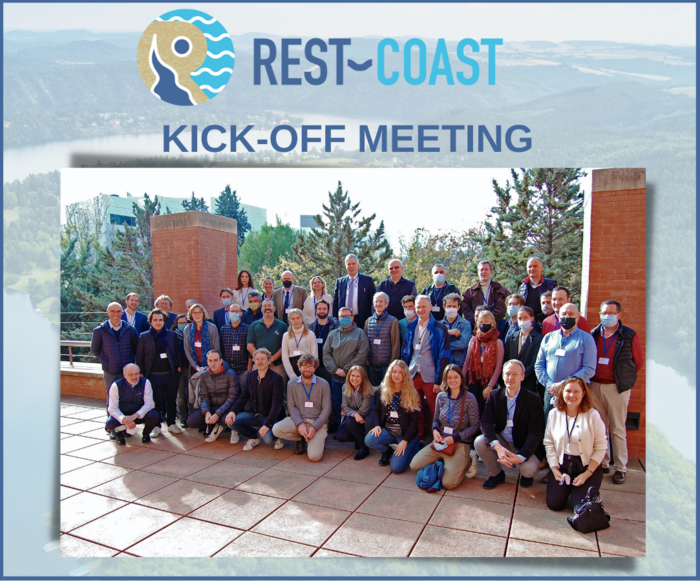Prominent marine and coastal ecologists, maritime engineers and economists from 38 organizations across Europe, Israel and Turkey came together in Barcelona between November 2nd and 5th, 2021 for the official commencement meeting of a new project.
 A group photo of the REST-COAST consortium. (Image Credit: Pensoft Publishers).
A group photo of the REST-COAST consortium. (Image Credit: Pensoft Publishers).
It is one of the four projects, among 180 candidates, financially backed by the so-called Green Deal call of the EU Horizon 2020 program supporting ecosystem restoration and their services.
Under the guidance of Project Coordinator Prof. Augustin Sanchez-Arcilla and Project Executive Dr. Iván Caceres from the Polytechnic University of Catalonia (UPC), the meeting covered the challenges, milestones and work plans ahead of this huge project. REST-COAST research undertakings are focused on nine pilot sites.
Three of these sites, among which is the Ebro Delta on the Spanish Mediterranean coast, will gain from massive restoration actions.
REST-COAST will attempt to resolve certain key challenges faced by coastal ecosystems currently — all an outcome of a long history of environmental degradation of coasts and rivers. Even now coastal management is mostly based on single-sided use of resources established as unsustainable in the long term.
These inherent issues are at present intensified by climate change. For example, rising sea levels result in coastal erosion and loss of soil fertility in coastal regions because of infiltration of salty water in the aquifers, as witnessed in the Ebro Delta, a chief rice-producing region in Spain.
Likewise, many dams and barrages upstream of several European rivers have significantly decreased the natural movement of sediments from mountainous regions toward the sea. The decreased deposition of sediments results in the retreat of deltas witnessed in just a few decades and is frequently measured in several square kilometers of fertile land lost to the ocean.
The goals of REST-COAST are to establish that mass coastal restoration is not only possible but also essential to help humans adapt to climate change. Coastal ecosystems can offer low-carbon adaptation potential to minimize risks and offer gains in biodiversity, ecosystem service delivery (such as flood protection, agri- and aquaculture and tourism).
Unless we decarbonise coastal protection and introduce the exceptional coastal blue Carbon potential of coastal ecosystems, it will be hard to simultaneously advance in coastal protection and climate mitigation.
Prof. Augustin Sanchez-Arcilla, Project Coordinator, Polytechnic University of Catalonia
Prof. Sanchez-Arcilla anticipates that REST-COAST “will demonstrate how coastal adaptation can be carried out with a controlled carbon footprint and cost, although it will require early action and investments based on coastal optimism.”
The restoration of at-risk coastal ecosystems, such as dunes, wetlands or seagrass beds, entails the overcoming of economic, technical, governance and social blockades to restoration upscaling.
REST-COAST will restore connectivity of the perturbed river-to-coast and boost the resilience and delivery of coastal ecosystem services, for which the pilot sites will offer sufficient opportunity under present and future climate settings.
The nine Pilots signify vulnerability hotspots for the key EU regional seas (Baltic, North Atlantic, Black and the Mediterranean). Through engaging communication events, REST-COAST will boost the commitment of stakeholders, citizens and policymakers toward the long-term upkeep of coastal restoration.